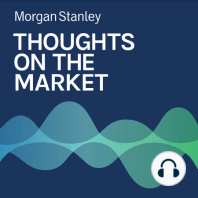4 min listen
Europe: Geopolitics and the ECB
ratings:
Length:
11 minutes
Released:
Apr 7, 2022
Format:
Podcast episode
Description
As the European Central Bank prepares to meet, the war in Ukraine continues to add to uncertainty, forcing investors in Europe to adjust their expectations for the remainder of the year. Chief Cross Asset Strategist Andrew Sheets and Chief Europe Economist Jens Eisenschmidt discuss.Important note regarding economic sanctions. This research references country/ies which are generally the subject of selective sanctions programs administered or enforced by the U.S. Department of the Treasury’s Office of Foreign Assets Control (“OFAC”), the European Union and/or by other countries and multi-national bodies. Any references in this report to entities, debt or equity instruments, projects or persons that may be covered by such sanctions are strictly incidental to general coverage of the issuing entity/sector as germane to its overall financial outlook, and should not be read as recommending or advising as to any investment activities in relation to such entities, instruments or projects. Users of this report are solely responsible for ensuring that their investment activities in relation to any sanctioned country/ies are carried out in compliance with applicable sanctions. ----- Transcript -----Andrew Sheets Welcome to Thoughts on the Market. I'm Andrew Sheets, Morgan Stanley's Chief Cross Asset Strategist.Jens Eisenschmidt And I'm Jens Eisenschmidt. Morgan Stanley's Chief Europe Economist.Andrew Sheets And today on the podcast we'll be talking about the outlook for Europe's economy amid possible rate hikes, business reopenings and the war in Ukraine. It's Thursday, April 7th at 3 p.m. in London.Andrew Sheets Jens, clearly we're dealing with a lot in Europe right now amid the Ukraine conflict and I want to get into that situation and the impacts on the economy. But given that the European Central Bank is meeting in just a few days and there is speculation about possible rate hikes, let's start there. Maybe you could give a bit of a background on what we expect the ECB is going to do.Jens Eisenschmidt Thanks a lot, Andrew. First of all, let me say that we don't expect any change at next week's meeting relative to what the ECB has been saying in March at their last meeting. They're essentially keeping all options open. They have started on a gradual exit from their very accommodative monetary policy. They have increased the pace of policy normalization at their last meeting, and we do not expect the ECB to change that roadmap now. Just as a reminder, the roadmap is asset purchases could end in Q3 and any interest rate hike would come sometime thereafter. And any decision on ending asset purchases and rate hikes is highly data dependent. And that really it takes us to the current situation. Inflation continues to surprise to the upside. We just had a 7.5 percentage point print in March, and this undoubtedly does increase the pressure on the ECB to act. At the same time, there are significant downside risks to the outlook for growth in the Euro area stemming essentially from the Ukraine-Russia conflict, and this puts a premium on treading very carefully with any changes to the monetary policy configuration, hence the emphasis on optionality, flexibility and gradualism by the ECB.Andrew Sheets Jens, when you talk about gradualism, that implies that the inflation that we're seeing in Europe is more temporary, is more transitory, isn't going to get out of hand. Can you talk a little bit about what is different at the moment between inflation in Europe and inflation in the U.S.?Jens Eisenschmidt I think there are a lot of technical aspects that indeed you could be looking at on that question, but I think it's sufficient for our purposes here really to focus on the key difference. In the U.S. there's a huge internal demand component to inflation. While the same is not true for the euro area, where most of the inflation, you could argue, largest part is imported through energy. Another difference is that the outlook for the economy is slightly
Released:
Apr 7, 2022
Format:
Podcast episode
Titles in the series (100)
Andrew Sheets: A Second (and Third) Opinion for Equity Markets by Thoughts on the Market
